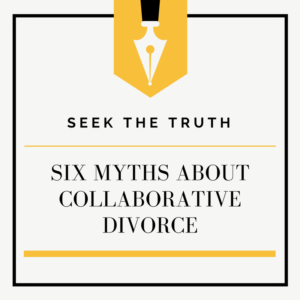If you know me, you might be under the impression that I can think of no reason not to choose the collaborative divorce option, but you would be wrong. While its adherents tout its many advantages and the process will almost always benefit its participants, there are a few good reasons not to choose it. But not as many as I’ve recently seen popping up on the Internet. So, let’s explore the most common reasons given for choosing not to collaborate, while, at the same time, debunk some myths about the process.
1. If you and your spouse cannot reach a collaborative settlement agreement, your participation agreement requires your attorneys to withdraw rather than participate in any subsequent litigation. Many lawyers complain that this requires a collaborative client to research trial lawyers, consult with them, and then spend the time to establish a healthy rapport with the one she chooses, when she has already done this homework once already.
Aside from the fact that clients often change lawyers during their divorce litigation, this “reason” always amuses me because our theoretical client at this point in the divorce options discussion is usually sitting in an office with an attorney whom she has only just met, with whom she has not yet worked, and with whom she has little to no rapport.
Regardless, while this may appear true in theory, it is never true in practice. If the collaborative process terminates without agreement, the collaborative attorney refers his client to a trial lawyer whom he trusts and whom he brings up to speed. Furthermore, the trust that the client established with her collaborative attorney is transferred to this new lawyer by reason of the referral from her trusted advisor.
If we look behind this so-called “reason,” a cynic might conclude that the attorney who recommends against collaboration is really only operating from self-interest; he or she doesn’t wish his lucrative relationship with a new client short-circuited by the collaborative disqualification provision. Such advice certainly seems to violate the prohibition on conflicts of interest with which all lawyers are tasked.
2. The second reason given for not recommending the collaborative divorce process is related to the first, but does have more weight to it. Because of the disqualification provision, many people believe that, because you must retain new attorneys for the courtroom, you will pay more in legal fees overall, i.e. than you would have paid had you headed straight to court in the first place. (See, e.g., https://dadsdivorce.com/articles/is-collaborative-divorce-right-for-me-5-pros-and-cons/.) However, this will only be true in extreme cases. And the opposite will be true in many more divorces. Why?
Usually, similarly to mediation, even in the 10% of “unsuccessful” collaborations, some issues are resolved, just not all of them. Thus, the issues left for the judge are more streamlined, saving on legal fees in court.
Furthermore, the spouses often agree to use the collaborative expert’s work, on finances, for example, or on vocational rehabilitation, or on a parenting plan, in the subsequent litigation, again saving on fees, both expert and otherwise.
So, while this can be a serious detriment, it rarely turns out that way.
3. A third reason not to choose the collaborate option, rarely heard but with more merit than either of the first two, is if one (or both) of the spouses suffers from a mental illness that prevents effective participation in the process, either because he is incompetent (which might foreclose litigation, as well, at least for some proscribed period of time) or because a personality disorder prevents her from doing so.
For example, if the spouse suffers from an inability to establish stable relationships with other people, or an unstable sense of self, or unstable emotions, little can be done to enable that person to trust the process and/or the professionals involved. Trust in the process and in the team is critical to collaboration; thus, lack of trust will prevent successful participation.
A collaborative team facilitator should be able to identify such mental illness and advise the client’s lawyer as to the client’s ability to participate before he executes a participation agreement.
Lawyers unfamiliar with collaborative practice argue that you must trust your spouse to fully disclose her assets and debts and to communicate openly and honestly about the issues in your case, which is not likely for spouses in the midst of divorcing. (See, e.g., dadsdivorce.com, supra.) But the trust to which we refer in collaboration is not trust in the spouse so much as trust in the process and the professionals.
4. Domestic violence may be a valid reason to opt out of the collaborative approach. Like Reason #3, however, the interdiction should not be automatic. There are varying degrees and types of domestic violence; the real issue is the question of the victim’s ability to make voluntary decisions. See Peterman, Linda. “Domestic Violence and Collaborative Divorce.” Champions of Collaborative Divorce, edited by Joryn Jenkins, Open Palm Press, 2017.
Note, too, that the traditional courtroom process often abuses victims again by virtue of how litigation works. So that choice might be worse than the collaborative option.
5. Another interesting reason given for choosing to litigate is that a divorcing couple cannot avoid the courtroom altogether anyway; at least one spouse must attend a hearing to obtain the court’s approval of the settlement agreement as to parenting matters, over which the judge maintains authority despite any agreement.
But this argument is also fallacious. First, many jurisdictions no longer require a final hearing. Second, even when required, they rarely consume more than five minutes, as opposed to litigation, which can consume as much as three-to-five years. And third, as with mediation, it would be an extraordinary case for a judge to overrule the decisions agreed upon by a child’s parents. I’m not saying it never happens; just that it is exceedingly rare.
6. Finally, a last argument I’ve heard made against the collaborative divorce process involves the neutrals on the team, that there can be legitimate differences of expert opinions, in business valuations, for example, and, thus, having a retained expert for each of you, as is common in litigation, is more akin to getting a second opinion from a doctor to discover potentially costly mistakes in one expert’s opinion. I don’t disagree with this argument, except that it erroneously assumes that one can’t obtain two experts on the same issue in a collaborative matter. In fact, I’ve seen it further posited that, if you disagree with your collaborative expert, then you must breach the collaborative participation agreement and start the process anew in court, which, again, is simply not true.
What does all of this mean? Mostly, it means that attorneys who are giving advice such as I have described above are advising their clients erroneously. And it means that, now that the statute has been passed, we all need to be able to correctly advise clients as to how the collaborative process works.
Contributor:
 Joryn Jenkins
Joryn Jenkins
Open Palm Law, Win-Win Solutions by Joryn Jenkins
3839 W Kennedy Blvd. | Tampa, FL 33609
(813) 870-3839
www.openpalmlaw.com






